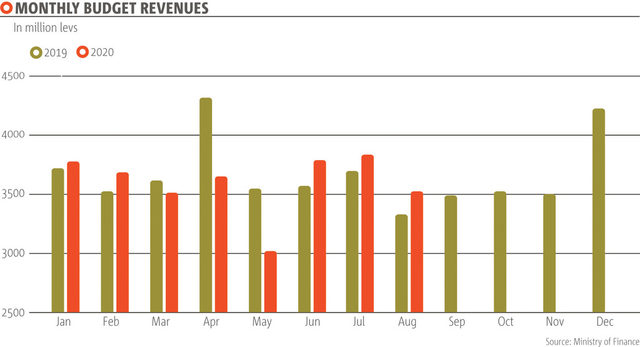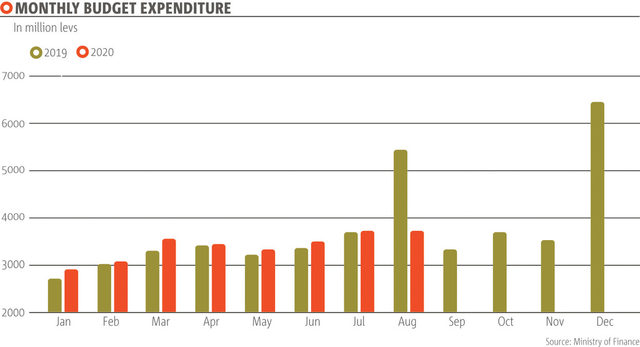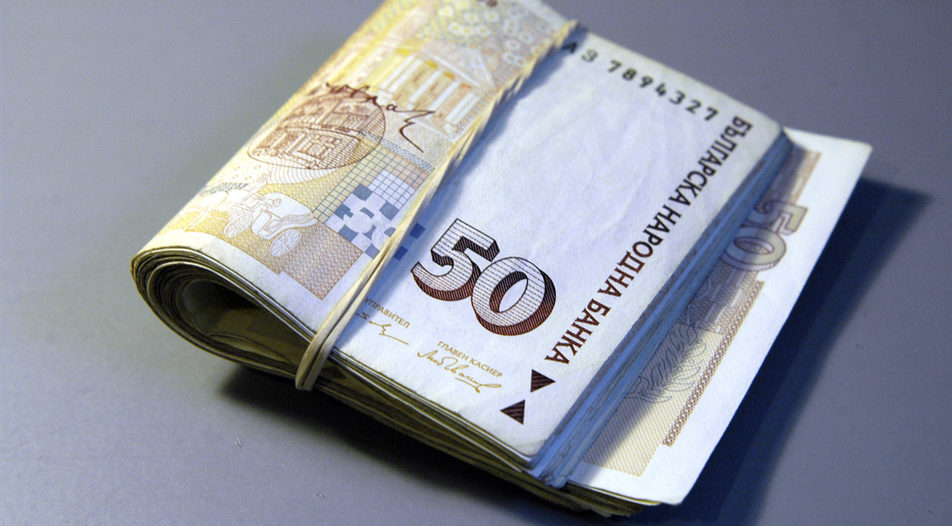So far, the daily anti-government protests in Bulgaria that began in early July have not led to the resignation of the third cabinet led by Boyko Borissov. However, the sense of urgency among those in power has escalated. In a single week in August, the government promised and allocated over half a billion levs (around 250 million euro) to various sectors of the economy, hoping to quell further protests. Among the recipients were industries affected by the coronavirus lockdown like tourism, as well as employees from 28 government agencies. While the coronavirus is partly to blame for the need to increase funding, the hasty allocation of additional money by a cabinet under pressure to resign shows that it can hardly afford an even greater public discontent.
The coronavirus pandemic already forced a revision of the government budget for the year in April, making it significantly different from the original bill. Currently, the Ministry of Finance is betting on a consolidated budget deficit of 3.5 billion levs equivalent to 2.9% of the projected gross domestic product (GDP), compared to a balanced budget previously. However, since April the government has promised a lot more funding than was planned under the revision. A second revision seems increasingly unlikely given that the government should come up with a draft of the 2021 budget bill in October. Therefore, the likelihood is growing that the government will accumulate a bigger deficit than planned in the revised budget. To cover the additional costs, in September the government borrowed 2.5 billion euro by issuing Eurobonds on international markets.
Funding the administration
A large-scale new spending measure envisages the distribution of over 300 million levs in additional payments to retirees plus 250 million levs meant for higher remuneration for personal assistants for disabled persons and people working in healthcare.
Another spending allocation popped up unexpectedly when the partners in the government coalition comprising Borissov's GERB party and United Patriots negotiated and later put up for public discussion a proposal to increase by up to 30% the salaries of 33,600 public sector employees working in 28 government agencies. The increase would cost the budget an additional 16.5 million levs per month or close to 200 million levs per year, according to the Ministry of Finance's estimates. Those getting a pay rise were to include "staff of administrations tasked with managing the pandemic and the aftermath of COVID-19, including for front-line workers" and "administrations where wages are lower compared to other institutions, in dissonance with the scope of their responsibilities and the direct risk to health", according to the motives for the proposal. This peculiarly selected group encompasses one-third of all civil servants in the country.
A few days later, amid ongoing public criticism, the Council of Ministers hastily approved an increase in the allocated funds for salaries in nine government ministries, including the Ministry of Finance, the Ministry of Transport, the Ministry of Agriculture, Food and Forestry and the Ministry of Regional Development. A part of the increase comes from internal redistribution of money - meaning, for example, funds allocated for investments will now be used for a pay rise. However, the additional funds are mostly injections from the national budget.
On top of that, it later emerged that additional funds will be awarded to police - the government approved a total remuneration increase of 29 million levs for officers working overtime in activities related to the coronavirus pandemic. In addition, municipalities received 122 million levs to cover increased costs for personal assistants.
For farmers and tourism
The threat of further protests has become an extremely good stimulus for getting state decisions - and money - quickly. Although they received much less than what other industries requested, tour operators and travel agents also sat at Borissov's table in August and left with state help in hand. The government promised them an additional 10 million levs from the EU's Operational Programme Innovation and Competitiveness. The money will be distributed in the form of grants to more than 3,000 tour operators and travel agents in the country. Although the amount was far less than the 155 million levs the sector demanded, the sum has reduced the tension among its representatives for now.
However, the biggest piece of the pie would go to firms in agriculture, where the money will come from both the state budget and unallocated funds in the Rural Development programme. A total of 106.3 million levs for three anticrisis measures will be paid by October to farmers and processors of agricultural products, according to the Ministry of Agriculture. Afterwards, the transfers for direct subsidies to farmers begin.
In addition, 140 million levs from the Rural Development Programme will be transformed into "fast-moving" direct subsidies to farmers. As a result, according to preliminary estimates, the subsidy per square meter of cultivated land will increase and, consequently, so will the state aid for the fruit and vegetable growing sector.
The government also plans to increase the funds allocated to the agricultural sector from the state budget by injecting an additional 49 million levs in state aid schemes, as well as an additional 16 million levs in the form of fuel cost reduction for used agricultural machinery.
At this stage, the Ministry of Agriculture also has plans to revive a scheme for low-interest loans from the State Fund Agriculture (SFA) for investment in the sector, as well as to request permission from Brussels to help "improve the liquidity of farms, which have deferred their debt payments and are unable to repay them under COVID-19 conditions."
As a whole, government aid to agriculture is estimated to reach about 1.7 billion levs by the end of the year.
The budget now
All of these additional expenses will burden this year's budget and likely next year's one as well. However, it seems that the future stability of public finance is not on the government's agenda. Budget performance data from the Ministry of Finance shows that budget revenues continue to lag behind the revised estimates. By the end of July, the budget has received 53% of corporate tax revenue planned for 2020, compared to 56% in the same period of last year. Revenues from VAT are also 3 percentage points lower than what was collected between January and July 2019.
Non-tax revenues like fees for public services have risen to a little over 1.2 billion levs by the end of July, which is 41% of the full-year sum set in the budget. For comparison, by July 2019 the revenues exceeded 55% of what was planned for that year.
By July, spending was within the bounds of normalcy for the current cabinet - only 48% of the expenses planned for the year had been made. The buffer, as usual, is investment expenses - although the budget has set them at close to 3 billion levs for the year, only 10% have been implemented by July. In previous years, the budget surplus would swell until November. Then, the GERB-led cabinet would quickly distribute the extra funds at a couple of meetings with no public debate.
History is likely to repeat itself in November and December given the ongoing protests and upcoming presidential and parliamentary elections in the spring of 2021. But this year, there might be no budget surplus to spend come December given the scale of the ongoing distribution of funds to quell public tensions in the country. It is very likely that either the typical December spending spree came early this year, or Bulgaria is looking at a significantly larger budget deficit than initially planned.


So far, the daily anti-government protests in Bulgaria that began in early July have not led to the resignation of the third cabinet led by Boyko Borissov. However, the sense of urgency among those in power has escalated. In a single week in August, the government promised and allocated over half a billion levs (around 250 million euro) to various sectors of the economy, hoping to quell further protests. Among the recipients were industries affected by the coronavirus lockdown like tourism, as well as employees from 28 government agencies. While the coronavirus is partly to blame for the need to increase funding, the hasty allocation of additional money by a cabinet under pressure to resign shows that it can hardly afford an even greater public discontent.












